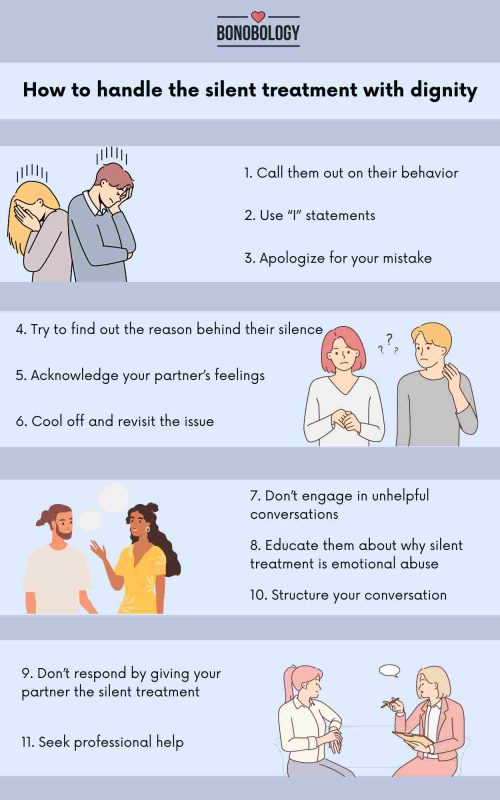Harsh, unkind words aren’t the only thing that can cause immense hurt to the people we love. Giving someone the silent treatment can inflict emotional wounds as well. It creates a huge void among partners in intimate relationships. When one partner is silent and cold, the other reels from isolation and hurt. As this toxic behavior chips away at the victim’s self-esteem and self-worth, it can be hard to figure out how to handle the silent treatment with dignity and protect oneself from long-term emotional damage.
Now, what is the silent treatment? It is when a person refuses to engage in conversation with another, shuts themselves down, and appears inaccessible. According to studies, interpersonal emotional experiences such as heartbreak, manipulation, and stonewalling have the same effect on a person as physical pain and can be hard to cope with.
So, is ignoring someone abuse? To find out more about the nuances of silent treatment in relationships and how to handle it, we reached out to counseling psychologist Aakhansha Varghese (MSc Psychology), who specializes in different forms of relationship counseling, from dating and premarital to breakup, abuse, separation, and divorce. She says, “Giving someone the silent treatment speaks volumes about your character. It’s an unhealthy way of dealing with problems in a romantic relationship. If a person can’t confront a difficult situation, it shows a lack of maturity. Likewise, the person on the receiving end tends to get so emotionally scarred by the experience that they may be at a loss on how best to handle the situation.”
Why Do People Resort To Silent Treatment
Table of Contents
If your partner is giving you the silent treatment, it shows how they can’t handle uncomfortable situations and emotions. It speaks volumes about their character because ignoring someone creates an atmosphere of stress, anxiety, and fear. It threatens the very idea of love because love is supposed to be calming and peaceful. That’s why, when subjected to such behavior, you may be left wondering, “Is ignoring someone abuse?”
When done intentionally and with the objective of gaining control and manipulating the other person, silent treatment amounts to abuse. Relationships are supposed to provide a sense of safety. When someone uses silent treatment in relationships as a tool to control you, it goes against what love is. That’s why it becomes difficult to figure out how to handle the silent treatment with dignity because this toxic trait can take a toll on your mental health.
Aakhansha says, “Stonewalling is one of the red flags in a relationship. People who resort to silent treatment have low self-esteem. It’s often a learned response. Chances are when this person was a child, they must have experienced their caregiver/guardian shut down and not respond to conflict or an uncomfortable situation. When silence is used to express their vexation, it makes the child feel ostracized and rejected. This is when the child starts feeling worthless and the caregiver’s behavior has a severe impact on their self-esteem.”
Intentionally or unintentionally, such people grow up believing that this response is justified because it is the only response to the conflict they have witnessed firsthand. Some other reasons why people resort to the silent treatment include:
- The person thinks their views and opinions aren’t valued or respected hence they go silent
- On the flip side, they think that the person they are in conflict with isn’t worthy of knowing their opinions and thoughts
- Silent treatment is the preferred tool of narcissists for punishing someone and gaining control of the situation. If your partner responds to conflict by shutting down, you may be dating a narcissist (It’s wise to reach out to a licensed therapist if you suspect you’re dealing with narcissistic silent treatment)
- They have an intense desire to control and manipulate you
- They are immature and don’t know how to communicate
- Silent treatment is an indirect way of saying you are not good enough for them, and that’s one of the reasons why silent treatment is emotional abuse
Signs Your Partner Uses Silent Treatment To Manipulate You
You must learn to identify the difference between silence and silent treatment in intimate relationships. When you are in a healthy relationship, you often give each other space. You may go silent after an argument to cool off. It’s one of the healthy ways to avoid saying hurtful things to your partner. But once you’ve got a grip on your emotions, you come together and talk things out.
On the other hand, stonewalling someone in response to arguments in the relationship just to escalate the situation is unhealthy. Let’s say you and your partner argue and your partner gets offended and walks away. They decide to ignore you afterward knowing full well that this would make you anxious and sad. This is a classic case of one partner using silence to inflict pain upon the other. In situations like these, the silent treatment is emotional abuse.
Aakhansha says, “When your partner knows that their silence makes you miserable after an argument and they resort to it anyway, it’s one of the signs they are trying to manipulate you. They make you feel like you are responsible for their behavior and you have to earn their voice again by pleasing them and acting as per their whims and desires.” Before we find out how to handle the silent treatment with dignity, let’s get to know some signs your partner is resorting to silent treatment just to see you suffer:
- They constantly ignore you despite reaching out to them several times
- They are silent for days on end and you don’t know when they will talk to you again
- You are constantly worried that this behavior will end up being the reason for your breakup
- You feel like you are always walking on eggshells around them
- They talk to everyone except you
- They make you feel that their silence is your punishment
- It’s one of the signs they are trying to emotionally manipulate you with their silence, waiting for you to when you bend over backward to please them
- If you end up making efforts to reconcile after every fight, it’s one of the signs this is their tactic to manipulate you
Related Reading: Attachment Styles Psychology: How You Were Raised Affects Relationships
11 Expert-Backed Tips On How To Handle The Silent Treatment With Dignity
I learned to answer to what is the silent treatment and how it impacts relationships the hard way. My ex was unsettlingly adept at it. After every disagreement, argument, or fight, no matter how big or small, he’d shut me out until I extended an olive branch and made an effort to patch things up. Now, this could be hours, days, or weeks. It all depended on how soon I’d cave and the resolution always involved me taking full responsibility for the discord.
While this was the pattern, one incident in particular had me struggling to figure out how to respond to silent treatment without compromising my dignity. It was our anniversary and I had planned a nice dinner date but he showed up with three of his friends who were in town. That too without any intimation or discussing it with me first. Naturally, I was livid, and while I managed to put up appearances and made it through dinner, we got into an argument when he dropped me home.

He stormed out saying I had disrespected his friends and made him feel insulted in front of them. I decided I wasn’t going to make the first attempt to resolve the situation, and he ended up blocking me out for a whole month. There I was an anxious mess, wondering, “Will he come back after silent treatment? What had gone so wrong that he had snapped all communication with me?” It also made me wonder if I had, unwittingly, done something so wrong that he’d cut me out of his life without an explanation.
When a mutual friend finally brokered peace, my ex said he was just waiting for me to come to my senses and come around. At that point, I knew I would never learn how to win the silent treatment with him. We parted ways shortly after. If you find yourself in a similar situation but don’t want to give up on your partner, these expert-backed tips on how to handle the silent treatment with dignity might help you combat manipulation in your relationship and find a way to build a healthier dynamic:
1. Call them out on their behavior
If you’re often wondering how to respond to silent treatment meted out to you by your partner, you need to stop letting the behavior slide. Aakhansha says, “A healthy way to deal with the silent treatment is to call them out on their behavior. But do it subtly. Don’t make the situation worse by yelling at them, saying hurtful things, or venting your frustration at them. Talk to them when they are in a good mood and let them know how this behavior impacts you.”
You need to subtly convey to your partner, “Giving someone the silent treatment speaks volumes about your character.” Here are some of the things you can do to get that message across:
- “I noticed things are different between us now. We have lost the ability to communicate effectively. How can we turn this around?”
- “Are you using silence to cool off or is it a defense mechanism for difficult situations? Whatever the reason is, please know that it’s hurting me”
- “If you’re hurt by something I said or did, please tell me. You can’t use the silent treatment and expect me to read your mind”
Related Reading: How To Deal With A Husband Who Thinks He Does Nothing Wrong
2. Use “I” statements
Yes, the silent treatment is emotional abuse. However, not everyone consciously uses it as a means to inflict pain on their partners. Often, it is the result of a person’s innate inability to have difficult conversations or a desire to avoid confrontation or even escape accountability for their actions. Now, we’re not saying that makes it okay to resort to silent treatment in relationships. Nor does it take away from the emotional distress of the person at the receiving end.
However, understanding the why can help you ascertain how to handle the silent treatment with dignity. If you feel that your partner stonewalls you after a conflict to avoid confrontation or accountability, the best way to get through to them is to use “I” statements. This way, you can let them know how their behavior makes you feel, without making them feel like they’re being blamed or accused.
3. Apologize for your mistake
Aakhansha says, “It always takes two to tango. If your partner is stonewalling you, then the possibility of being hurt by your actions cannot be ruled out. Start by apologizing for your mistake. Don’t take accountability for your actions.”
That said, a romantic relationship should be about equality. If one partner is apologizing, so should the other. You can’t leave room for a power imbalance. Wondering how to handle the silent treatment with dignity? Here are some things you can say to sincerely apologize for the hurt and make them see the error of their ways as well:
- “I am sorry for the hurtful things I said. I hope you too are sorry for everything you said and did in retaliation”
- “I have apologized for my mistakes. I would appreciate it if you could do the same”
- “We can’t carry on with this relationship with ego in the driver’s seat. We have to apologize to each other when we mess up, otherwise, our issues will never be resolved”
Related Reading: How Do You Apologize To Someone You Love — So They Know You Mean It
4. Try to find out the reason behind their silence
When dealing with such behavior, a very important question that needs to be addressed is: is ignoring someone abuse? Aakhansha says, “Not always. Sometimes people who give you the silent treatment don’t do it out of spite. They may not even know that their silence is causing you immense pain and stress. They have trouble understanding their own emotions. This makes them withdraw from communicating. It shows the person’s lack of confidence in themselves and the relationship. They think speaking up will do more damage than staying silent. Hence, they think silence is golden.”
That’s to be able to deal with the silent treatment, you need to understand where it’s stemming from. If the silent treatment in relationships is used to cool off after a fight, then it can be a healthy way of dealing with conflicts in a relationship. But if they are stonewalling you to manipulate you or tip the power dynamics in the relationship in their favor, then you need to understand this is a form of mental abuse.

5. Acknowledge your partner’s feelings
When your partner expresses themselves and shares why they go silent and shut you out, acknowledge their feelings. The answer to how to win the silent treatment may lie in empathy, after all. So, if your partner opens up,
- Don’t get defensive
- Don’t go into problem-solving mode instantly
- Be present in the conversation and let them know you’re trying to understand their perspective
- Ask questions if you need to
6. Cool off and revisit the issue
Now, there is no guarantee that this approach to how to handle the silent treatment with dignity will go as planned. Perhaps, your partner has been giving you the silent treatment because they’re too angry, hurt, or overwhelmed to handle the situation maturely. In such circumstances, when you make an effort to resolve the deadlock, they may react in ways you hadn’t expected.
If that happens and your partner responds in a threatening or abusive manner such as resorting to yelling and name-calling, you must remove yourself from the situation and revisit the issue when tempers have simmered down on both ends. Sometimes, silent treatment in relationships can be a wall holding back a deluge of negativity and anger, and if that wall breaks, your first instinct should be to protect yourself.
Related Reading: Does Taking Time Apart In A Relationship Really Work?
7. Don’t engage in unhelpful conversations
It can be immensely frustrating to watch your partner behave as if you’ve suddenly become invisible to them while they go about being nice and amenable to everyone else. After all, what is the silent treatment if not a tool to inflict psychological chaos on another person? When you’re the one dealing with the chaos brewing in your mind because of your partner’s decision to shut you out, it makes you desperate to get a reaction out of them.
However, don’t let this desperation drive you to stir up unhelpful conversations that won’t help remedy the situation at hand. No matter how frustrated or angry you are at your partner,
- Don’t rake up old issues
- Don’t say provocative things just to get a reaction out of them
- Don’t lash out
- Don’t resort to verbal abuse of any kind
8. Educate them about why silent treatment is emotional abuse
Will he come back after the silent treatment? Will she understand that this treatment is causing more harm than good? Yes, it can happen but you may have to find a way to educate them about their toxic attitude. But make sure you keep the conversation constructive, instead of saying things like, “Giving someone the silent treatment speaks volumes about your character.” Let them know that you feel isolated when they use the silent treatment. Every relationship has its ups and downs. Couples argue. The way they resolve conflicts in the relationship is what determines whether or not a relationship can survive.
Talking about how to win the silent treatment, Aakhansha says, “Tell them you’re not a mind reader and you have no way of knowing what’s going on inside their mind until they share it with you. You don’t have to raise your voice or make sarcastic comments to make your point. They may not know that their hostile behavior is unkind and deeply painful. It’s time you talk things over and differentiate between the right and wrong way of using silence.”

9. Don’t respond by giving your partner the silent treatment
Giving your partner a taste of their medicine is not the best answer to how to respond to silent treatment. Even if your partner is manipulative and is using the silent treatment to make you suffer and get their way, doesn’t mean you have to reciprocate in kind. Relationships don’t work that way. Instead, use these phrases when your partner pulls the stonewalling card:
- “When you’re ready to talk, let me know”
- “I know you’re hurting right now but so am I. If you keep ignoring me, things are only going to get worse”
- “There are rough patches in every relationship. It’s on you and me to work it out”
Related Reading: 23 Signs Of An Unhealthy Relationship
10. Structure your conversation
Create a structured conversation so that you don’t digress from the topic at hand — which happens often when you’re in the middle of an argument or a heated discussion with your partner. You start somewhere else and end somewhere else entirely. Establish fair fighting rules and control the urge to use cuss words, resort to name-calling, or yell at each other. Here are some ways you can approach the situation and communicate better with your partner:
- Avoid using words like “always” and “never”
- Focus on how you are feeling so that your partner doesn’t feel that you’re blaming them
- Clearly explain what’s bothering you. Tell them the way they shut down is unhealthy and hurtful
- Try the sandwich method of communication if you are struggling to decipher how to win the silent treatment. Compliment your partner first and then make a request followed by another positive statement. Sandwich your request or issue between two positive sentences
11. Seek professional help
Silent treatment in relationships invariably takes a toll on your mental health. If you feel the damage runs too deep or you and your partner lack the know-how to break free from this pattern, seek help. Of course, you can turn to trusted friends and family members for advice.
But when you feel overwhelmed by all the negativity born out of stonewalling and silent abuse, couples counseling can be immensely beneficial in creating self-awareness about negative behaviors and acquiring the tools to turn things around. If you have been considering getting help to figure out how to respond to silent treatment effectively, Bonobology’s counseling services are here for you.
Key Pointers
- What is the silent treatment? It is when a person refuses to engage in conversation with another, shuts themselves down, and appears inaccessible
- If your partner is aware of the fact that stonewalling and ignoring someone is abuse, then they are doing it purposefully to hurt you
- Most people who resort to silent treatment in relationships do it to avoid confrontation. They don’t know that it’s hurting the other person’s feelings. It’s a learned behavior and they think there is nothing wrong with it
- Handle the silent treatment with dignity by calling out their behavior. Educate them that ignoring someone is abuse and they can’t keep doing it
- When your partner pulls away after a fight, don’t force them to talk to you. Let them come to you on their own
If your partner refuses to understand you and keeps falling back into the pattern of the silent treatment, you need to set the record straight. Tell them you won’t tolerate this anymore. Setting firm boundaries is essential to protect yourself from behaviors that can be detrimental to your emotional health and well-being. Prioritize self-preservation, and then see if there is a way to protect your relationship without losing love, respect, and belief in one another.
I Hate My Husband – 10 Possible Reasons And What You Can Do About It
30 Manipulative Things Narcissists Say In An Argument And What They Actually Mean
Your contribution does not constitute a charitable donation. It will allow Bonobology to continue bringing you new and up-to-date information in our pursuit of helping anyone in the world to learn how to do anything.
Ask Our Expert
You must be Logged in to ask a question.



Featured
Emotional Abandonment In Marriage: Signs, Causes, And Ways To Cope
When Health Challenges Affect Your Relationship Dynamics
15 Signs That Your Girlfriend Isn’t Sexually Attracted To You
Feeling Suffocated In A Relationship: Reasons, Signs, Ways To Deal
How Long Should A Relationship Break Be? A Therapist Answers
Why Do I Struggle To Communicate With My Partner? An Expert Answers
Will He Come Back After Silent Treatment? 15 Ways To Make Sure He Does
How Online Nursing Degrees Influence Relationship Dynamics
Why Do I Miss My Boyfriend So Much: Reasons And Ways To Deal
21 Clear Signs She Doesn’t Want A Relationship With You
How Narcissists Treat Their Exes — 11 Common Things They Do And How You Can Respond
Emotional Distance: Meaning, Causes, Signs, And Ways To Fix
My Boyfriend Is Grieving And Pushing Me Away: Tips To Cope And Comfort Your Man
What To Do When Your Relationship Is At Breaking Point?
Am I Overthinking Or Is He Losing Interest? 18 Signs To Help You Identify
Discover Your Worth: 13 Ways To Feel Loved And Appreciated
23 Backhanded Compliment Examples in Everyday Life That Are Actually Insults
11 Things That Happen When A Woman Shuts Down Emotionally – And How To Reconnect
15 Signs Of Emotional Detachment In Your Relationship
How To Not Be Jealous In A Relationship – 15 Expert Tips